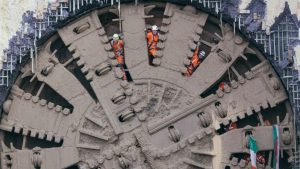The second giant boring machine (TBM) building HS2 under the Chiltern Hills has now broken through at the tunnel’s northern portal, completing a journey that began in June 2021.
Named Cecilia, the TBM has driven for 10 miles underground to join twin sister machine – Florence. She arrived at the site near the Buckinghamshire town of Wendover on 27 February, after completing her adjacent tunnel drive.

Between them, the two 2,000 tonne machines have built the twin bore tunnel at depths of up to 80 metres and excavated three million cubic metres of chalk. Each machine operates like an underground factory, able to excavate the tunnels and line them with 56,000 pre-cast concrete tunnel segments, grouting them into place and moving forward at an average speed of 16 metres per day.
When HS2 is operational trains will travel through the Chiltern tunnel – the line’s longest – at speeds of up to 200mph, helping to almost halve journey times between Britain’s two largest cities.
Align’s Underground Construction Director, Didier Jacques said:
“Ten miles is a long drive for a TBM, with a typical average being around three miles. The complexity and technically challenges of completing such a long drive for both our TBMs has been significant, however I am delighted that as a team, we have risen to the challenge.
“Both TBMs were designed in partnership with Herrenknecht and incorporate innovations and technologies that have been introduced on TBMs in the UK for the first time, to enhance performance and safety. This includes ‘semi-continuous boring’, allowing our TBMs to build the rings that line the tunnels without pausing.”
Each TBM is operated by a crew of around 17, working in shifts to keep the machines running when required 24/7. They are supported by over 100 people on the surface, managing the logistics and maintaining the smooth progress of the tunnelling operation.
In total over 450 people have worked on the tunnels over the last three years, including a dedicated production team who made 112,000 precision-engineered, fibre-reinforced concrete tunnel wall segments on site at a purpose build temporary factory – and a team processing the spoil from the tunnels.
Completion of tunnelling under the Chilterns follows recent publication of HS2 Ltd research showing how high-speed line’s arrival in the West Midlands will give a £10 billion economic boost over the next decade, with new development around its stations at Birmingham’s Curzon Street and near the city’s airport and the NEC.